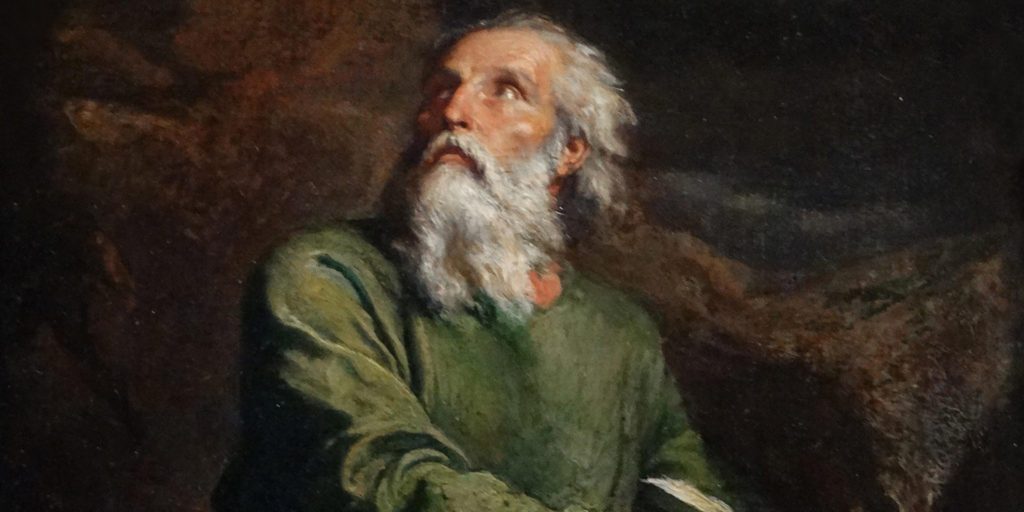
Salvation is the Lord’s: Prophetic Perspectives
 Matthew Barrett, executive editor of Credo Magazine, has edited a new book with Crossway titled, The Doctrine on Which the Church Stands or Falls: Justification in Biblical, Theological, Historical, and Pastoral Perspective. Many factors contributed to the Protestant Reformation, but one of the most significant was the debate over the doctrine of justification by faith alone. In fact, Martin Luther argued that justification is the doctrine on which the church stands or falls. This comprehensive volume of 26 essays from a host of scholars explores the doctrine of justification from the lenses of history, the Bible, theology, and pastoral practice—revealing the enduring significance of this pillar of Protestant theology.
Matthew Barrett, executive editor of Credo Magazine, has edited a new book with Crossway titled, The Doctrine on Which the Church Stands or Falls: Justification in Biblical, Theological, Historical, and Pastoral Perspective. Many factors contributed to the Protestant Reformation, but one of the most significant was the debate over the doctrine of justification by faith alone. In fact, Martin Luther argued that justification is the doctrine on which the church stands or falls. This comprehensive volume of 26 essays from a host of scholars explores the doctrine of justification from the lenses of history, the Bible, theology, and pastoral practice—revealing the enduring significance of this pillar of Protestant theology.
Today we are highlighting Willem VanGemeren’s chapter “Justification in Prophetic Perspective.” Here is an excerpt to get you started:
Jews and Protestants have the same Old Testament books but differ in their canonical divisions and ordering of the books. The Hebrew Bible has three divisions: the Torah (Pentateuch, or five books of Moses), the Nevi’im (Prophets), and the Ketubim (Writings). It is better known by the acronym TaNaK(h).[1] The books of the Nevi’im consist of two subdivisions: the Former Prophets, with four books (Joshua, Judges, the two books of Samuel, and the two books of Kings), and the Latter Prophets, also with four books (Isaiah, Jeremiah, Ezekiel, and the Twelve [i.e., the Minor Prophets]).[2] The Ketubim, or Writings, include the Poetical Books (Psalms, Job, Proverbs, Song of Songs, Ecclesiastes, Lamentations), Ruth, Esther, Daniel, Ezra, Nehemiah, and the two books of Chronicles. These three divisions of the Hebrew Old Testament may be thought of as three concentric circles. At the center of each is the triune God, who communicates himself in the three disparate canonical divisions: the revelation in Moses (Torah), in the Prophets, and in the Writings. Our focus is on the Prophets, particularly the Latter Prophets.
Moses (the Law) and the Prophetic Narratives
Moses
Moses clearly teaches that salvation is by grace and that justification is by faith. He witnesses to the frailty of the first humans, their disobedience, and the hope in God’s working out his purposes for humans in Jesus Christ. The patriarchs were instructed to place their hope in El Shaddai as they awaited the fulfillment of the divine promises. They were fully dependent on God, even though they made valiant strides to wing it on their own. In contrast, Moses, too, set out to deliver Israel in his own strength (Ex. 2:11–14). He had to learn to await God’s manner and timing of so great a salvation.
Moses was God’s uniquely chosen “prophet,” who served him faithfully for forty years. In this role, Moses was God’s appointed agent in Israel’s redemption from Egypt, teacher of Israel, mediator of the covenant, and founder of Israel’s tabernacle worship. He also witnessed Israel’s disobedience and rebelliousness and threatened Israel that they would not inherit God’s rest. The book of Deuteronomy is Moses’s final testimony to Israel, in which he taught Israel to learn from the story of God’s goodness and Israel’s rebelliousness, of God’s covenant and Israel’s failure to maintain the covenant, of God’s being a consuming fire but also remaining constant in his compassion for Israel, of God’s covenantal curses but also his promise to spiritually transform Israel by a circumcision of the heart. God is the true source of life, blessing, and grace (Deut. 30:20). He called on Israel to love the Lord: “And now, Israel, what does the Lord your God ask of you but to fear the Lord your God, to walk in obedience to him, to love him, to serve the Lord your God with all your heart and with all your soul” (10:12; cf. 6:5).[3] After all, God is the source, giver, and sustainer of life:
This day I call the heavens and the earth as witnesses against you that I have set before you life and death, blessings and curses. Now choose life, so that you and your children may live and that you may love the Lord your God, listen to his voice, and hold fast to him. For the Lord is your life, and he will give you many years in the land he swore to give to your fathers, Abraham, Isaac and Jacob.” (30:19–20)
Moses prophetically forewarned Israel of her failure and of the exile but also promised God’s ultimate compassion, forgiveness, and restoration (Deuteronomy 31–32).
Though Israel was permitted to enter the land, she could not enter the promise of rest (12:9–10; cf. Psalm 95). The Former Prophets develop the story of Israel’s search for rest. These four books—Joshua, Judges, Samuel, and Kings—are also known as the Deuteronomistic Books, so called because of their close affinity to the book of Deuteronomy. These books are a prophetic narrative that develops the outworking of God’s promises and curses (threats). The first of these books, Joshua, encouraged Israel to “serve” the Lord (Joshua 23–24) and trust in him for her future. Israel had not yet entered the rest. At the close of the prophetic narratives, we find Israel in exile and subjugated by the Babylonians and a remnant of Judah that was permitted to stay in the land (2 Kings 25). Out of fear of a Babylonian reprisal, some of those who were left in the land plotted against the good counsel of Gedaliah, who had encouraged the remnant to submit themselves to Babylon (25:25). When the Judeans had to seek refuge in Egypt, the story of redemption had come full circle. Israel had been redeemed from Egypt under Moses only to find refuge in Egypt hundreds of years later.
But even so, the Former Prophets end with a note of hope. Hope focused on Jehoiachin, one of the last kings of the Davidic dynasty. He was exalted by Nebuchadnezzar of Babylon (25:27–30). The light of Moses continued to flicker in the darkness of exile with the reassuring hope that God’s justice is also compassionate. Moses, the Prophetic Narratives, and the Latter Prophets Moses and the Former Prophets form the background of the Latter Prophets. Readers cannot apprehend the depth of God’s concern for humanity without a knowledge of the message of Moses and the Former Prophets.
The preexilic Latter Prophets warned Israel of her impending doom and called on the people to return to the Lord, because he is compassionate, gracious, longsuffering, and forgiving. Their threats and promises of hope harked back to Moses and the (Former) Prophets. The prophets corrected and clarified Israel’s understanding of the Mosaic hope. God was to be found in Israel’s story of faithlessness, which nonetheless was guided by God’s providence. The exile was not a historical accident. Israel’s story of denouncement took the people from idolatry to an openness and longing for the living God. The prophets were God’s messengers who perpetuated the legacy of Moses and the Former Prophets into and beyond the exile. They gave witness to a theological reality that opens believers to God’s promises of a new world in Jesus Christ. God is just in his judgment and compassionate and forgiving. Micah affirms,
Who is a God like you, who pardons sin and forgives the transgression
of the remnant of his inheritance?
You do not stay angry forever but delight to show mercy.
You will again have compassion on us; you will tread our sins underfoot
and hurl all our iniquities into the depths of the sea.
You will be faithful to Jacob, and show love to Abraham,
as you pledged on oath to our ancestors in days long ago. (Mic. 7:18–20)
The prophetic witness is best understood by innerbiblical appropriations, images, and metaphors. The Latter Prophets connect with the prophetic vision, rooted in Moses, and project their vision to a postexilic world. They project God’s compassion and forgiveness during and after Israel’s history of rebelliousness. Hope lies in God alone. The late Dutch theologian Hendrikus Berkhof summarized the theological dimension 98 Willem A. VanGemeren of hope in the Old Testament in relation to God’s fidelity thus: “Faithful Israel had access to the unknown future because it knew about past and present and believed in the faithfulness of its God. We may say that the eschatology of Israel is the confession of God’s faithfulness projected on the screen of the future.”[4]
Read Dr. VanGemeren’s entire chapter in The Doctrine on Which the Church Stands or Falls.
Endnotes
[1] Tanakh: The Holy Scriptures (Philadelphia: Jewish Publication Society, 1988).
[2] Daniel is not treated as a prophetic writing in Jewish circles. The Twelve count as one book in the Hebrew Bible. See Ron Haydon, “Seventy Sevens Are Decreed: A Canonical Approach to Daniel 9:24–27,” JTISup 15 (Winona Lake, IN: Eisenbrauns, 2016), 150–52.
[3] Unless otherwise noted, Scripture quotations in this chapter are from the NIV.
[4] Hendrikus Berkhof, A Well-Founded Hope (Richmond, VA: John Knox, 1969), 17–18.

